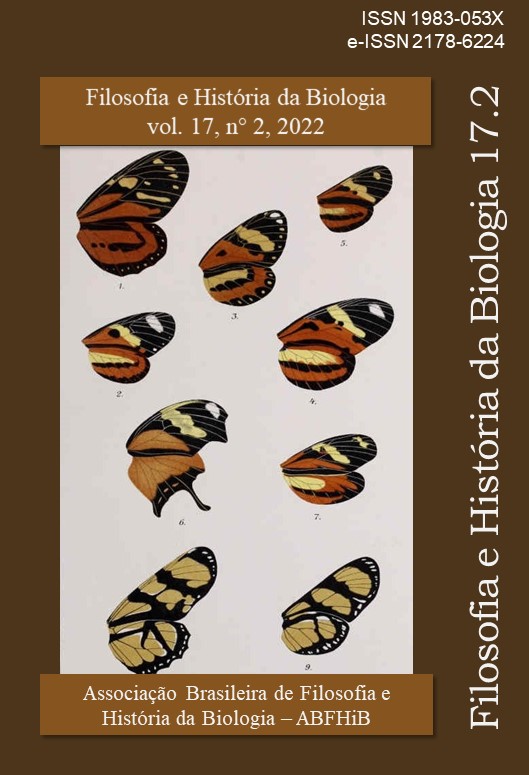The approach of the human person from the perspective of the brain and its limits
DOI:
https://doi.org/10.11606/issn.2178-6224v17i2p231-263Keywords:
Person, Brain, Reductionism, NeurosciencesAbstract
This paper argues for a conception of the human person based on the brain structures and functionalities, taking into account some difficulties arising from an ontological commitment to reductionist materialism. Being a person will be considered given anatomic, functional, and cognition-behavioural aspects, trying to identify some elements to determining the existence of a human person. It discusses issues about reducing a person to more basic entities or processes or whether it is possible to explain it through the organism or, more appropriately, by its brain. Rejecting the person’s reduction to the brain due to the philosophical limits of the brain sciences, we hope to find an answer according to the neuroscience findings.
References
AQUINO, Tomás de. [séc. XIII] Suma teológica: volume I. Trad. Carlos-Josaphat de Oliveira. 3ª Ed. São Paulo: Loyola, 2005.
BAKER, Lynne Rudder. Persons and bodies: a constitution view. New York: Cambridge University Press, 2000.
BAKER, Lynne Rudder. Naturalism and the first-person perspective. New York: Oxford University Press, 2013a.
BAKER, Lynne Rudder. Can subjectivity be naturalized? Metodo International Studies in Phenomenology and Philosophy, 1 (2): 15-25, 2013b. Disponível em: . Acesso em: 27 ou-tubro 2021.
COELHO, Jonas Gonçalves. Mente como cérebro e cérebro como mente: a dupla face da relação mente-cérebro. Pp. 93-99, in: AIUB, Monica; GONZALEZ, Maria Eunice Quilici; BROENS, Mariana Cláudia (orgs.). Filosofia da mente, ciência cognitiva e o pós-humano: para onde vamos? São Paulo: FiloCzar, 2015.
DAMÁSIO, António. [1978] O livro da consciência: a construção do cérebro consciente. Lisboa: Temas e Debates, 2010.
DAMÁSIO, António. O erro de Descartes: emoção, razão e cérebro humano. São Paulo: Cia das Letras, 2012.
DENNETT, Daniel. [1978]. Brainstorms: ensaios filosóficos sobre a mente e a psicologia. Trad. Luiz Henrique de Araújo Dutra. São Paulo: UNESP, 1999.
FRANKFURT, Harry Gordon. Freedom of the will and the concept of a person. The Journal of Philosophy, 68 (1): 5-20, 1971. DOI: https://doi.org/10.2307/2024717.
GALVÃO, Pedro. Identidade pessoal. Pp: 1-18, in: BRANQUINHO, João; SANTOS, Ricardo (eds.). Compêndio em linha de problemas de filosofia analítica. Lisboa: Centro de Filosofia da Universidade de Lisboa 2013. DOI: https://doi.org/10.51427/cfi.2021.0044.
GUYTON, Arthur. Neurociência básica: anatomia e fisiologia. Trad. Charles Alfred Esbérard e Cláudia Lúcia Caetano de Araújo. 2ª ed. Rio de Janeiro: Guanabara Koogan, 1993.
GUYTON, Arthur; HALL, John Edward. Tratado de fisiologia médica. Trads. Alcides Marinho Junior; Alexandre Vianna Aldhhieri Soares; Andréa Delcorso; Barbara de Alencar Leão Martins; Claudia Coana; Débora Sitnik; Diego Alfaro; Douglas Arthur Omena Futuro; Fabiana Buassaly; Hermínio de Mattos Filho; Leonardo Allevato Magalhães; Luísa Sá Barreto Pimentel; Manoela D’ Almeida Sande; Marcela Jardim Gomes Elias; Maria Inês Correa Nascimento; Michelle Gralle Botelho; Nelson Gomes de Oliveira; Raimundo Rodrigues Santos; Roberto Mogami, Sérgio Rachman; Solange Castro Affeche, Valdir de Souza Pinto; Vilma Ribeiro de Souza Varga. 13ª ed. Rio de Janeiro: Elsevier, 2017.
HARMAN, Gilbert. The inference to the best explanation. Philosophical Review, Durham, 74 (1): 88-95, janeiro, 1965. DOI: https://doi.org/10.2307/2183532.
HATTORI, Wallisen; YAMAMOTO, Maria Emília. Evolução do comportamento humano: psicologia evolucionista. Estudos de Bio-logia, Ambiente e Diversidade, 34 (83): 101-112, jul./dez., 2012. DOI: http://dx.doi.org/10.7213/estud.biol.7323.
HIGGINS, Edmund; GEORGE, Mark. The neuroscience of clinical psychiatry: the pathophysiology of behavior and mental illness. 2ª Ed. Philadelphia: Lippincott Williams & Wilkins, 2013.
LAVAZZA, Andrea; ROBINSON, Howard (eds.). Contemporary dualism: a defense. New York: Routledge, 2014.
LENT, Roberto. Cem bilhões de neurônios? Conceitos fundamentais de neurociência. 2ª edição. São Paulo: Atheneu, 2010.
LIPTON, Peter. O melhor é bom o suficiente? Trad. Marcos Rodrigues da Silva e Alexandre Meyer Luz. Princípios Revista de Filoso-fia, 17 (27): 313-329, 2010. Disponível em: . Acesso em: 20 maio 2021.
LYCAN, William. Redressing substance dualism. Pp: 22-39, in: LOOSE, Jonathan; MENUGE, Angus John; MORELAND, James Porter (eds.). The Blackwell companion to substance dualism. New Jersey: Wiley Blackwell, 2018.
MACHADO, Angelo. Neuroanatomia funcional. 2ª Ed. São Paulo: Atheneu, 2006.
MACHADO, Angelo; HAERTEL, Lucia Machado. Neuroanatomia funcional. 3ª Ed. São Paulo: Atheneu, 2014.
MANZOTTI, Riccardo; MODERATO, Paolo. Neuroscience: dualism in disguise. Pp: 81-97, in: LAVAZZA, Andrea; ROBINSON, Howard (eds.). Contemporary dualism: a defense. New York: Routledge, 2014.
MURCHO, Desidério. Lógica elementar: raciocínio, linguagem e realdade. Lisboa: Edições 70, 2019.
PINKER, Steven. How the minds work. London: Peguin, 1999.
QUERVAIN, Dominique J.-F. de; BENTS, Dorothée; MICHAEL. Tanja; BOLT, Brenda K. Wiedernbold; MARGRAF, Jürgen; WILHELM, Frank H. Glucocorticoids enhance extinction-based psychotherapy. Proceedings of the National Academy of Sciences of the United States of America, 108 (16): 6621-6625, 2011. DOI: https://doi.org/10.1073/pnas.1018214108.
RACHELS, James. [1986]. The elements of moral philosophy. New York: Mc Graw-Hill Education, 2018.
SCHWAB, Klaus. A quarta revolução industrial. Tradução: Daniel Mi-randa. São Paulo: Edipro, 2016.
SOLYOM, L.; TURNBULL, I. M; WILENSKY, M. A case of self-infllicted leucotomy. The British Journal of Psychiatry, 151 (6): 855-857, 1987. DOI: https://doi.org/10.1192/bjp.151.6.855.
SWINBURNE, Richard. The existence of God. 2ª ed. Oxford: Clarendon Press, 2004.
SWINBURNE, Richard. Uma defesa do dualismo de substâncias. Tradução: Jaimir Conte. Princípios Revista de Filosofia, 15 (23): 291-313, 2008. Disponível em: . Acesso em: 10 feve-reiro 2019.
SWINBURNE, Richard. Mind, brain, and free will. Oxford: Oxford University Press, 2013.
SWINBURNE, Richard. Are we bodies or souls? Oxford: Oxford University Press, 2019.
VAN FRAASSEN, Bas C. [1980]. Imagem Científica. Trad. Luiz Henrique Dutra. São Paulo: UNESP, 2007.
VAZ, Henrique Claudio de Lima. Antropologia filosófica II. São Paulo: Edições Loyola, 1992.

Downloads
Published
Issue
Section
License
Copyright (c) 2022 Filosofia e História da Biologia

This work is licensed under a Creative Commons Attribution-NonCommercial-ShareAlike 4.0 International License.
The published manuscripts become the property of the journal Philosophy and History of Biology, and the authors accept the terms of this license and agree to assign the copyright for publication, in addition to agreeing with the publication's commitment to offering open access to all of its content. The information and concepts issued in signed papers are the sole responsibility of their authors.

 cademia.edu
cademia.edu
